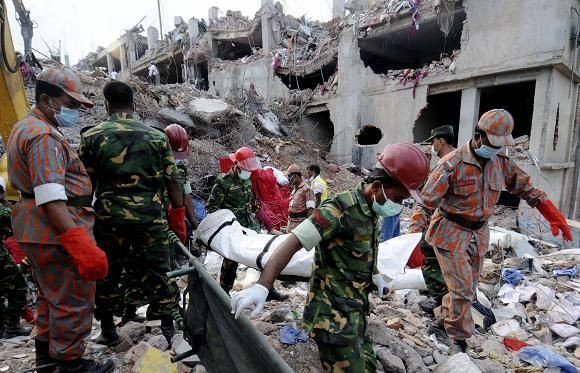Bangladesh: With Death Toll From Factory Collapse Now At 1,127; H&M Signs Factory Safety Agreement; Government Will Raise Minimum Wage

The Bangladeshi government announced on Monday that it will raise the minimum wage for garment factory workers for the first time since 2010, in response to the April 24 garment factory collapse near the capital Dhaka that has now killed an estimated 1,100 people.
Garment factory workers in Bangladesh currently make an average of U.S. $38 per month. There is no word yet on how much the wages will be raised. After a series of protests in 2010, the government raised the minimum wage 80 percent to the current $38, AP reports. This raise was still significantly less than the $72 per month for which workers were asking, Liana Foxvog, director of Organizing and Communications at the International Labor Rights Forum, or ILRF, said.
“The minimum wage is so low in Bangladesh it could be tripled or quadrupled and the workers would still not be making nearly as much as workers in China make,” Foxvog said. Garment factory workers in China make the equivalent of U.S. $285 per month, according to the ILRF.
In addition to the wage hike, the government announced it has approved an amendment to a 2006 Labor Act that will allow workers to unionize without having to obtain permission, AP reports.
In addition, Swedish mega-retailer H&M announced on Monday it would be signing a safety accord, pledging that it will provide sufficient financing for independent safety inspections and mandatory repairs and renovations. In its statement, H&M (STO:HM-B) called it a “pragmatic step” to improving building safety.
H&M is the biggest buyer of Bangladeshi products in the world. Of 5,000 garment factories in the country, H&M operates in more than 160 of them, the ILRF said.
Wal-Mart (NYSE:WMT), the second-largest buyer of Bangladeshi products, has not signed the agreement. Other signatories on the agreement include Inditex, which owns fashion retailer Zara, among others, and Prestige Brands Holdings (NYSE:PBH), which owns Tommy Hilfiger and Calvin Klein.
Foxvog said she didn’t anticipate that any of these major changes would drive Western companies away from Bangladesh. “We’re not worried about increasing minimum wage and negatively impacting workers or losing jobs,” she said. “There’s a reason [Western companies] are in Bangladesh; it’s because wages are so low.”
The ILRF is also petitioning Gap Inc. (NYSE:GPS) and JC Penney Company Inc. (NYSE:JCP) to sign the agreement.
© Copyright IBTimes 2024. All rights reserved.






















